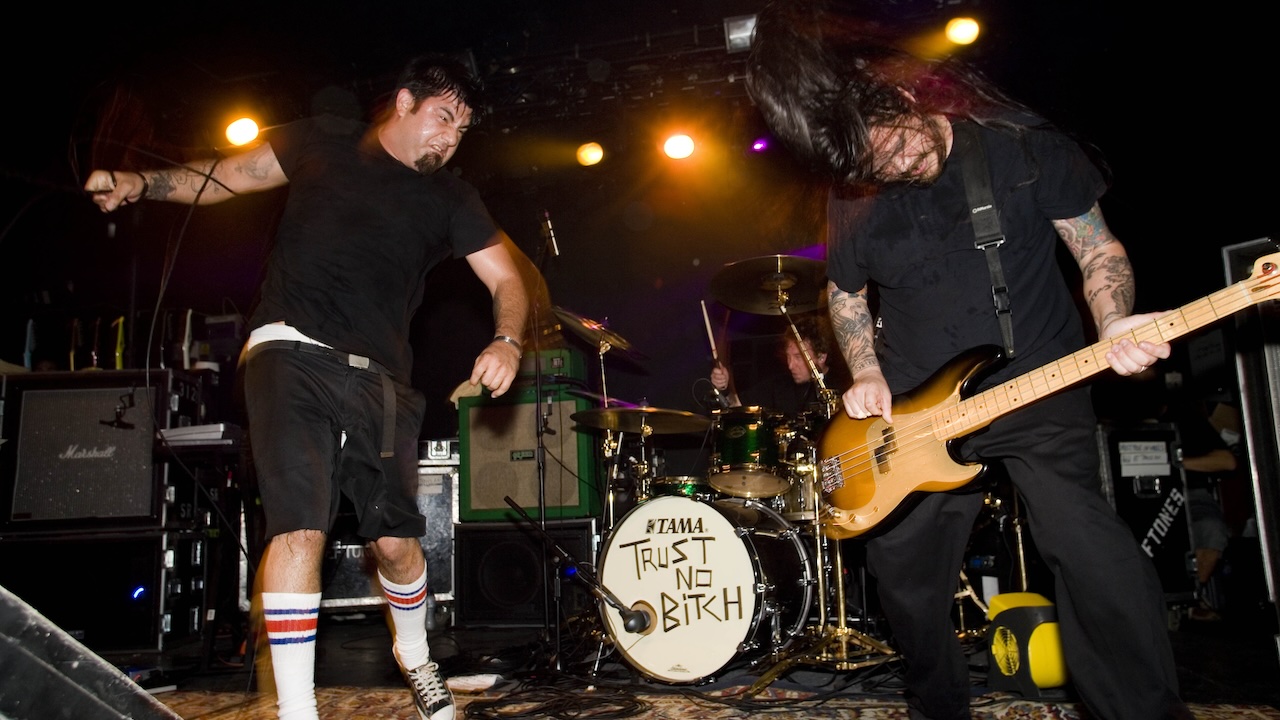“My feel drives Stephen nuts – he’d rather have a traditional metal bass player who uses a pick and follows his every move. Instead, I counter his every move”: Chi Cheng on his final Deftones album – which took almost three years to complete
According to the late Chi Cheng, Saturday Night Wrist was the first time he’d really locked in with the drums

All the latest guitar news, interviews, lessons, reviews, deals and more, direct to your inbox!
You are now subscribed
Your newsletter sign-up was successful
Every now and then, you get a band which genuinely defies expectations. Sacramento outfit Deftones are one of this elite, formed in 1988 and emerging from the almost wholly regrettable nu-metal sound of the mid to late-'90s with a deeper, immensely textural approach of their own.
Long-term readers of Bass Player will know that Deftones' original bassist Chi Cheng was left in a coma after a car accident in 2008. Cheng never emerged from his coma, tragically passing away in 2013. Sergio Vega filled his position up until 2021, playing on three albums – Diamond Eyes, Koi No Yokan and Gore.
Cheng always dared to bring a different brand of bass playing to the Deftones. His rich, textured tone and tendency to wander off on melodic flights deviated from the script that demanded metal bassists merely mimic the guitar.
Cheng's philosophy of independence might have also contributed to the bands' dysfunction in the early 2000s – the group took almost three years to complete its 2006 release, Saturday Night Wrist.
“It's not a very nice group,” Cheng told Bass Player. “Instead of focusing on our own parts, we all nitpick about each other's parts. It can be really problematic.”
But Saturday Night Wrist was transcendent – and according to Cheng, the band was tighter and hungrier than it had been since its earliest days.
Helmed by Pink Floyd producer Bob Ezrin, the album marked Cheng's final official release with the band. A followup record, Eros, remains in the vaults following the bassist's accident.
All the latest guitar news, interviews, lessons, reviews, deals and more, direct to your inbox!
The following Bass Player interview took place in February 2007.
How do you see your role in the Deftones?
“I bring a reggae vibe, and sometimes a Rocco Prestia kind of feel. It drives our guitarist Stephen nuts because he'd rather have a traditional metal bass player who uses a pick and follows his every move. Instead, I counter his every move.”
Do you consider yourself a technical bass player?
“I'm not a technical guy, but I take full advantage of the creative freedom I have to write interesting basslines in my own style. I consider it a strength in the band, although others may disagree.”
How do you approach your instrument?
“When the song is melodic and there's room to breathe, I like to fill up the space with cool, classy lines. I've always appreciated bassists who bring a lot to the table, like Steve Harris of Iron Maiden, Cliff Burton with Metallica, or Matt Freeman with Rancid. And I play really hard with my right hand.”
Do you record with a four- or five-string bass?
“I do almost everything on four-string because it's nearly impossible to make my five sound good in the studio. I tune my Tele bass EADG or drop everything a whole-step, and I tune the P-Bass down as much as two steps.”
Describe the studio dynamic between you and drummer Abe Cunningham.
“Even when he's recording, he knows only about 80 percent of what he's going to do. That makes it nearly impossible for me to lock with him, because sometimes I have no idea where he's going.
“I used to think I was the cool drunken punk-rock bass player, but I cleaned up on Saturday Night Wrist. I paid close attention to the kick, snare, and hi-hat. This is the first album where Abe and I really locked.”
How has your role evolved along with Deftones' creative process?
“In the early days, Stephen and I wrote all the music and Chino sang his lyrics. The process changed when Chino started playing guitar. For Saturday Night Wrist, Chino was like Glenn Miller tending to his big band, involving himself in every aspect of the music without conceptualizing any lyrics or melodies.”
Did you write any music for the album?
“Some of the music I wrote ended up making the album, including the instrumental U, U, D, D, L, R, L, R, A, B, Select, Start. Stephen and I wrote the music to Beware. But really, I don't care who writes what, just as long as it's great. I don't think we've created our masterpiece yet. I'd like to do that before the band breaks up.”

Nick Wells was the Editor of Bass Guitar magazine from 2009 to 2011, before making strides into the world of Artist Relations with Sheldon Dingwall and Dingwall Guitars. He's also the producer of bass-centric documentaries, Walking the Changes and Beneath the Bassline, as well as Production Manager and Artist Liaison for ScottsBassLessons. In his free time, you'll find him jumping around his bedroom to Kool & The Gang while hammering the life out of his P-Bass.



